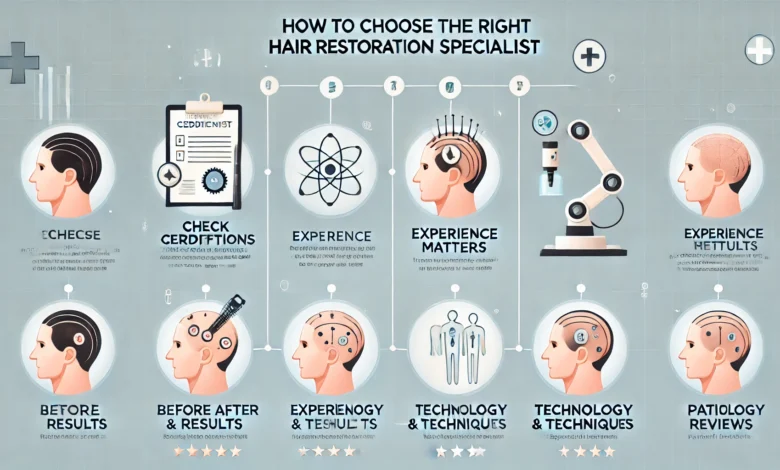How to Choose the Right Hair Restoration Specialist

Hair Loss Solutions: A Growing Demand
The global demand for hair restoration solutions continues to surge, fueled by increasing awareness, technological advancements, and a strong desire for restored confidence. Recent statistics reveal that millions of men and women experience hair loss, with many seeking professional help to regain a youthful look and positive self-esteem. In the past, hair loss options were limited and not always effective, but the field has dramatically evolved over the last decade.c Understanding hair transplant recovery Springfield, VA is vital to achieving optimal results and long-lasting satisfaction. New technology has refined recovery protocols, and clear expectations are essential for ensuring a smooth transition from treatment to daily life. Choosing a knowledgeable, reputable hair restoration specialist has never been more critical as expectations grow. Your choice will directly influence your safety, satisfaction, and outcome.
Understanding Qualifications: What Makes a Specialist?
Not all practitioners offering hair restoration are equally qualified. It’s essential to look for professionals with accredited medical degrees and appropriate board certifications, typically in dermatology, plastic surgery, or a related specialty. These credentials demonstrate a rigorous education and training background specific to the complexities of hair loss and its treatment. Specialized training in hair restoration ensures that the practitioner is adept at diagnosing the causes of hair loss and providing the appropriate treatment for each unique patient, as there are many underlying reasons why hair loss can occur, including hormonal issues, nutritional deficiencies, or genetic predispositions.
Experience Counts: Evaluating Track Records
The skill and experience of your hair restoration specialist are essential factors in achieving a natural and effective result. Experience allows providers to refine their technique and develop nuanced decision-making skills that can only come with years of hands-on practice. When evaluating a physician, inquire about their history in the field, including the number of years in practice and the volume of procedures performed monthly or annually. Specialists with a high case volume often possess mastery of different hair types and complex scenarios.
Technology and Techniques: What to Ask About
Medical advances have greatly impacted hair restoration, making today’s options more effective, comfortable, and discreet. Modern methods, such as FUE, use tiny punches to extract individual hair follicles, resulting in minimal scarring and faster recovery, while robotic-assisted technology boosts precision and consistency. During your consultation, ask the provider about their equipment and technology. Clinics investing in state-of-the-art tools often deliver better outcomes and shorter recovery times.
Personalized Consultations: Why Customization Matters
Every hair loss situation is unique. Competent specialists conduct a detailed consultation, considering factors like age, hair type, degree of loss, overall health history, and future goals. Such attention to detail allows for the development of an individualized treatment plan and increases the likelihood of a natural-looking restoration. A specialist who takes the time to conduct scalp assessments, review your medical record, and discuss realistic expectations is invested in achieving the best outcome.
Facility Standards and Patient Safety
Your first impression of a clinic should reassure you of its professionalism and commitment to patient well-being. A reputable office will adhere to strict hygiene protocols, use sterilized equipment, and comply with regional healthcare regulations. Visually inspect the cleanliness of the facility and observe how staff manage patient flow and care. Staff should be trained in emergency management, safety protocols, and proper handling of medical equipment.
Inquire about aftercare protocols and whether the clinic provides comprehensive post-procedure guidance. Well-run clinics perform the procedure safely and provide patients with clear instructions, resources, and support for optimal recovery.
Balancing Cost, Value, and Outcomes
Understanding the cost structure for hair restoration procedures can prevent unpleasant surprises. Some specialists may offer package deals or financing plans, but the lowest price doesn’t always mean the best or safest choice. It’s important to ensure that you decide based on expertise, facility quality, and overall value rather than cost alone. Ask whether the quoted fee includes pre-op visits, post-treatment care, and necessary follow-up appointments.
Staying Informed: Red Flags and Best Practices
To ensure you receive safe, effective care, stay vigilant for red flags like unlicensed practitioners, overly aggressive marketing, or guarantees of unrealistic results. Reputable providers will never make promises they cannot fulfill and will always prioritize informed consent and patient education. Trusted organizations, such as the International Society of Hair Restoration Surgery, provide directories and guidance on finding reputable providers.


